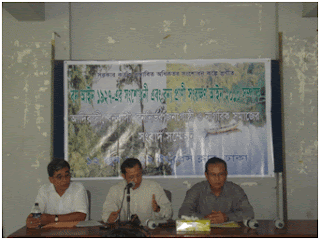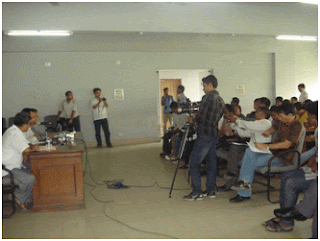[(From left) Sudatta Bikash Tanchangya, general secretary, Movement for the protection of land and forest in CHT,
His Majesty Barrister Raja Devasish Roy, chairperson of Maleya Foundation, and Gautam Dewan, President of
Movement for the protection of land and forest in CHT, present their statements at the press
conference.]
Maleya
Foundation in collaboration with Bangladesh Indigenous Peoples’ Network on Climate Change and
Biodiversity (BIPNetCCBD), and
Movement for the protection of land and forest in CHT, held a press conference on the draft amendment to the Forest
Act, 1927 and the draft of Wildlife (Preservation) Act, 2010, at Dhaka press
club on June 12, 2012.
[A partial view of the audience at the program;]
Sudatta Bikash
Tanchangya, general secretary, Movement for the protection of land and forest in CHT said there is a new clause titled ‘other forest’ in the draft amendment to the
Forest Act, 1927. This clause allows the government absolute authority to
declare the lands where for ages the indigenous peoples have been following
traditional cultivation, widely known as ‘jhum’
cultivation, other forests. Once an area is declared ‘other forest’, the forest dependent peoples, if found even catching
fish inside, can be charged with criminal cases like the way it is in practice
in a reserve forest, Mr. Tanchangya went on saying, adding further that if the
government do not consult the forest dependent indigenous peoples before giving
a final nod to these two draft Acts, their will remain no forest, and existence
of forest-dependent indigenous peoples in the future.
In his short speech, His Majesty
Barrister Raja Devasish Roy, chairperson of Maleya Foundation, said that the draft amendment to the Forest Act,
1927 and the draft of Wildlife (Preservation) Act, 2010 are totally opposite to
the forest management system, which involves the local forest-dependent peoples
in the entire process. Since the birth of the country, Bangladesh signed and
ratified many conventions and treaties i.e. Convention on Biological Diversity
(CBD), which speak for upholding the rights of the forest-dependent peoples
while going for managing a forest. Even the 1927 Forest Act has a clause titled
‘village forest’, using what the
government can easily hand over the management system of a forest to local
village community people. But it seems the government is walking on the wrong
way as through the draft amendment to the Forest Act, 1927 and the draft of
Wildlife (Preservation) Act, 2010, the government is likely to be in favor of
giving more power to the Forest Department authority. If these draft Acts
finally come into being, the Forest Department’s officials will be able to use
fire arms at will in the name of self-defense against the forest-dependent
peoples, and this is against human rights,
His Majesty said further.
He recollected the days when he had been a Special
Assistant to the Chief Advisor (2006-2008) of Bangladesh with the rank and
status of a State Minister for the Ministry of Environment and Forests, to
share with the audience that the forests managed by Forest Department are less
rich than those managed by local indigenous peoples. At this stage he pointed a
finger at some Ms. Dona Chakma, who was present among the audience, and said,
“Dona Chakma and her village people in CHT have a forest covering an area of
some 500 acres of land, where still tigers roam around in the wild. But we have
not heard there are tigers in any forests, managed by the Forest Department.”
His Majesty
finally urged the government to go for making the clauses of the two draft Acts
widely known to all, and for consulting the forest-dependent indigenous peoples
and the Regional Council, and the Hill District Councils in CHT as per the
requirements inscribed in CHT-Accord.
It should be mentioned that the draft of Wildlife
(Preservation) Act, 2010 has recently been passed in the House on July 08,
2012.



No comments:
Post a Comment